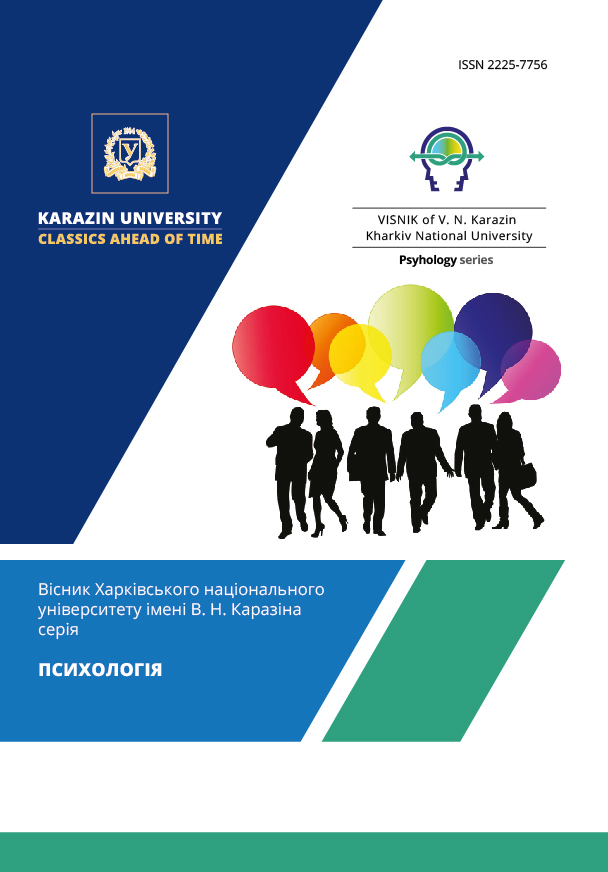METACOGNITIVE ABILITIES’ ORGANIZATION AT STUDENTS
Abstract
Present investigation is aimed on studying the student’s metacognitive abilities peculiarities depending on their professional education direction. The research is realized on a student’s sample of natural (Biology), philological (Foreign Languages) and mathematical (Mathematics) directions of learning. The following methods were used in the work: verbal-colour interference test (J. R. Stroop); motor test (J. Schwarzlander); third subtest of WAIS test; Thinking Styles Inventory (R. Sternberg); The Matching Familiar Figures Test (J. Kagan); Study of subjective control’s level (E. F. Bazhin, E. A. Golynkina, L. M. Etkind); «Analytical Review of Learning Style» (Rebecca L. Oxford). To determine the structure of metacognitive abilities, the method of factor analysis (Varimax raw) was carried out. As a result of factorization four factors were identified: metacognitive monitoring; personal control; self-organization of activity; activity programming. Each of the factors can be represented as a separate component of metacognitive abilities. The revealed structure corresponds to the concepts of J.H. Flavell, C.D Fritht, S.G. Paris and P. Winograd. Component “Metacognitive monitoring” is subject-nonspecific, it means that metacognitive knowledge does not depend on the field of professional education. Components “Self-Organization of Activity”, “Activity programming” and “Personal Control” have differences depending on the direction of student learning. Biology students (natural science) have a high level of “Self-organization of Activity” component. Students of the Faculty of Foreign Languages (philological direction) are characterized by the predominant development of the components “Self-organization of Activity” and “Activity programming”. Students of mathematics (mathematical direction) are distinguished by the developed components «Personality control» and «Activity programming». Subject-specific or subject-nonspecific nature of the components in the metacognitive abilities’ structure is summarised in conclusions.
Downloads
References
Avgustyuk M. M. (2014) Metakognіtivnij monіtoring yak skladova metapіznannya. Naukovі zapiski nacіonalnogo unіversitetu «Ostrozka akademіya». Serіya «Psichologіya і pedagogіka». 30. 3-7.
Docevich T. І. (2013) Shlyachi ta zasobi dіagnostiki metakognіtivnoї kompetentnostі vikladachіv. Vіsnik Kharkіvskogo nacіonalnogo pedagogіchnogo unіversitetu іm. G. S. Skovorodi. Serіya Psixologіya. 46 (2). 62-75.
Karpov A.V ., Skityaeva I.M. (2005) Psichologiya metakognitivnyh processov lichnosti: monografiya. M.: IP RAN.
Karpov A.A. (2015) Osnovnye tendencii razvitiya sovremennogo metakognitivizma: metodicheskie ukazaniya. Yaroslavl: YarGU.
Karpov A.A. (2012) Vzaimosvyazi obuchaemosti i metakognitivnyр kachestv lichnosti. Yaroslavskij pedagogicheskij vestnik. 3 (ІІ). 228-225.
Karpov A.A. (2017) Differencialnye aspekty strukturnoj organizacii metakognitivnyh kachestv lichnosti uchashihsya vyshih uchebnyh zavedenij. aroslavskij pedagogicheskij vestnik. 4. 218-222.
Samojlichenko A. N., Tokmakova A.A., Rozhkova Yu.A. (2016) Vliyanie metakognitivnyh processov na uspevaemost studentov (na primere studentov ekonomicheskogo profilya). Azimut nauchnyx issledovanij: psixologiya i pedagogika. 4 (5). 393-395.
Svetlakova I.G. (2006) Pedagogicheskie usloviya formirovaniya metakognitivnyh sposobnostej studentov v processe inoyazychnoj podgotovki v VUZe. Psichologicheskij zhurnal. 7. 57-69.
Chernokova T.E. (2011) Metakognitivnaya psichologiya: problema predmeta issledovaniya. Vestnik pomorskogo universiteta. Seriya «Gumanitarnye i socialnye nauki». 3. 153–158.
Borkowski J. G., Chan Lorna K.S., Muthukrishna N. (2000) A Process-Oriented Model of Metacognition: Links Between Motivation and Executive Functioning. Issues in the Measurement of Metacognition. 1-41.
Briner-Lienhard P., Geraets E. (2006) Metakognition in der Volksschule Hochschule für Heilpädagogik. Zürich. Departement 1 Pädagogik bei Schulschwierigkeiten.
Cromley J. (1999) Learning to Think, Learning to Learn: What The Science Of Thinking And Learning Has To Offer Adult Education. Washington. National Institute for Literacy Literacy Leader Fellowship.
Flavell J. M. (1976) Metacognitive aspects of problem solving / In L.B. Resnick (Ed.) The Nature of Intelligence. – Hillsdale, NJ: Earlbaum.
Flavell J.H. (1979) Metacognition and cognitive monitoring: A new area of cognitive-developmental inquiry. American Psychologist. 34. 906-911.
Foundations of Metacognition (2012). Ed. by J. Perner, M.J. Beran, J. Brand, J. Proust. – Oxford: University Press.
Frith C. D. (2012) The role of metacognition in human social Interactions. Philosophical transactions of the Royal Society of London. Series B, Biological sciences. 367 (1599). 2213-2223.
Kluwe R. (1982) Cognitive Knowledge and executive control: Metacognition. In: D.R.Griffin (Ed.). Animal mind-human mind. – Berlin, Heidelberg, New York: Springer-Verlag. 221-224.
Neuenhaus N. (2011) Metakognition und Leistung. Inauguraldissertation in der Fakultät Humanwissenschaften der Otto Friedrich Universität Bamberg.
Paris S.G. (1988) Reading Strategies, Metacognition and Motivation. NY: Ass. for Supervision and Curiculum Development.
Schraw G., Moshman D. (1995) Metacognitive Theories. Educational Psychology Review. 4. 351-371.
Schoenfeld A. H. (1987) What’s All the Fuss About Metacognition? in Cognitive Science and Mathematics Education. London: LEA. 192-194.
Stewart P.W., Cooper S. S., Moulding L. R. (2007) Metacognitive development in professional educators. The Researcher. 21(1). 32-40.
Tanner K.D. (2012) Promoting Student Metacognition. CBE – Life Sciences Education.11. 113–120.
Weil L.G., Fleming S.M., Dumontheil I., Kilford E.J. (2013) The development of metacognitive ability in adolescence. Consciousness and Cognition. 22. 264-271.




